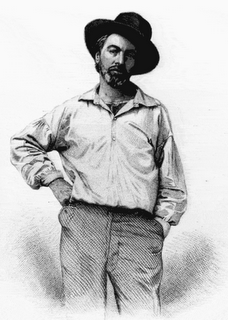
Ainda o maior poeta norte-americano
WALT WHITMAN
Por livre, por diverso, por formar parte de natureza, essa natureza que hoje agridem seus medíocres descendentes. Em homenagem aos criadores dignos de acima do Rio Bravo, começamos com Whespaço em inglês deste nosso blog.
Walter "Walt" Whitman (May 31, 1819 – March 26, 1892) is widely considered to be one of America's best and most influential poets.
Translated into more than 25 languages, Whitman is said to have invented contemporary American literature as a genre. He abandoned the rhythmic and metrical structures of European poetry for an expansionist freestyle verse, which delivered his philosophical view that America was destined to reinvent the world as emancipator and liberator of the human spirit.
Whitman, American poet, essayist, journalist, and humanist was born in West Hills, Huntington on Long Island in New York. His most famous work is Leaves of Grass, which he continued to edit and revise until his death. A group of civil war poems, included within Leaves of Grass, is often published as an independent collection under the name of Drum-Taps.
The first versions of Leaves of Grass were self-published and poorly received. Several poems featured graphic depictions of the human body, enumerated in Whitman's innovative "cataloguing" style, which contrasted with the reserved Puritan ethic of the period. Despite its revolutionary content and structure, subsequent editions of the book evoked critical indifference in the US literary establishment. Outside the US, the book was a world-wide sensation, especially in France, where Whitman's intense humanism influenced the naturalist revolution in French letters.
By 1864, Walt Whitman was world famous and Leaves of Grass had been accepted by a publishing house in the US. Though still considered an iconoclast and a literary outsider, the poet's status began to grow at home. During his final years, Whitman became a respected literary vanguard visited by young artists. Several photographs and paintings of Whitman with a large beard cultivated a "Christ-figure" mystique. Whitman did not invent American transcendentalism, but he had become its most famous exponent and he was also associated with American mysticism. In the 20th century young writers such as Hart Crane, William Carlos Williams, Allen Ginsberg, and Jack Kerouac rediscovered Whitman and reinterpreted his literary manifesto for younger audiences.
www.wikipedia.com
NESTE MOMENTO TERNO E PENSATIVO
Neste momento terno e pensativo
Aqui sentado a sós
Sinto que existem noutras terras outros homens
Ternos e pensativos,
Sinto que posso dar uma espiada
Por cima e avistá-los
Na França, Espanha, Itália e Alemanha
Ou mais longe ainda
No Japão, China ou Rússia,
Falando outros dialetos,
E sinto que se me fosse possível
Conhecer esses homens
Eu poderia bem ligar-me a eles
Como acontece com homens de minha terra,
Ah e sei que poderíamos
Ser irmãos ou amantes
E que com eles eu estaria feliz.